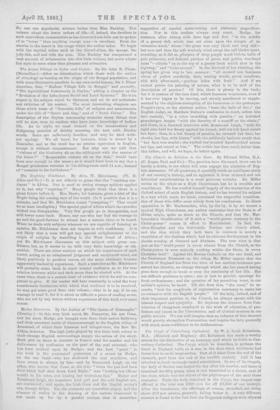The Chwch in Relation to the State. By Edward Miller,
MA. (C. Kogan Paul and Co.)—The question here discussed, there can be hardly a doubt, is one which will soon engage the attention of Eng- lish statesmen. Of all qnestions, it epeciallyneeds an intelligent study of our country's history, and to approach it from abstract and not historical considerations is a most grievous mistake. Mr. Miller writes on the whole as a High Churchman, but he is sensible and conciliatory. He has availed himself largely of the researches of the Oxford school of early English history, and ho has treated his subject in a way which must, we think, command the respectful considera- tion of those who differ most widely from his conclusions. In direct opposition to Mr. Maekonochio, who, by-the-by, is by no means a typical, High Churchman, our author maintains that the State is of divine origin, quite as much as the Church, and that Mr. Mae- konochie's identification of it with a "world-power contrary to the Christ-power" comes in effect to Manichaeism. In fact, the ultra-Ritualist and the Calvinistic Puritan are closely allied, and the idea which they both have in common is merely a repetition of the dualism which had its extreme development in the double worship of Ormuzd and Ahriman. The true view is that just as the " world-power is never absent from the Church, so the Christ-power is ever actively working within the State, in every Christian land." Against the Bottum Catholic on the one hand, and the Protestant Dissenter on the otheu, Mr. Miller argues that the Church of England has from the time of her earliest existence pre- served her identity, no change through which she hns passed having gone deep enough to break or snap the continuity of her life. She has difficult problems to solve ; one is how to provide openings for fresh enthusiasms ; and the question of lay preaching must, in our author's opinion, be faced. Till she does this, "she must," he re- marks, "lack the amplitude of organisation necessary to make her co-extensive with the English people." Of the laity, indeed, and of their important position in the Church, he always speaks with the utmost respect and sympathy. De deplores the absence from Con- vocation of clergymen employed in the work of education, of pro- fessors and tutors in the Universities, and of clerical masters in our public schools. Wo can well imagine that an infusion of this element would greatly strengthen Convocation, and inspire the laity generally with much more confidence in its deliberations.


































 Previous page
Previous page